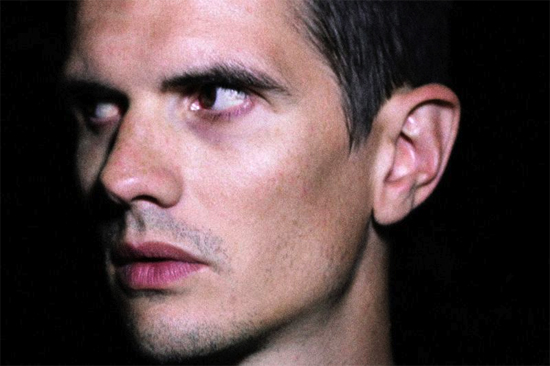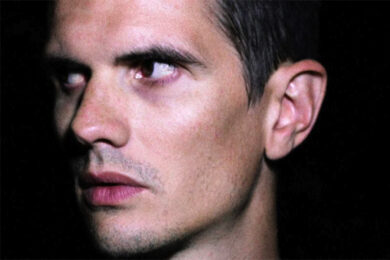Mathieu Peudupin, aka Lescop, is a 34-year-old Frenchman with a predilection for black clothes and an understated flick to his hips. His self-titled debut album, produced by Johnny Hostile and released on Savages’ Pop Noire label earlier this year, is made up of brilliantly executed nouveau cold wave that celebrates the pleasures of the night, all sung in the French language.
At his album launch concert at London’s Lexington, Lescop delivered something of a surprise. Rather than turning up with a computer and dashing synth-playing accomplice as you might have expected, the set was delivered with a full band of similarly attractive Frenchmen, the sort you’ll find in those French films where love lives are complicated and involve at least two people. It’s notoriously hard to translate intimate cold wave pop to live without big echoey drums stomping all over things like an ungainly first-timer, but if anything Lescop’s group widened out the material.
In my imagination Lescop is enormous in France, their more sophisticated ears better tuned to this dark, sensual romance, hordes of gorgeous teenagers heading to see him play live and sip wine, and kiss in bisexual abandon, where their British counterparts jump up and down to crap indie and puke up WKD. Alas, my French contacts tell me this isn’t so quite yet, and to not be so naive – their country does, after all, still consider Pete Doherty a hero rather than a helmet. Anyway, I dropped M Peudupin a line to find out more.
Can you tell us about the first music you fell in love with, and how and why it affected you?
Mathieu Peudupin: The first record I fell in love with was Eddie Cochran’s Cherished Memories, in particular the song ‘Skinny Jim’. At the time, my parents were listening to politically engaged music, which was pretty boring, but my mother was also listening to 50s rock n roll. The first time that I’d heard that, I was five years old and very enthusiastic about it. It was like an aesthetic shock to hear it, the images were cool. When you listen to Eddie Cochran you have images of American bad guys, of rebellion, knives, leather jackets… As a kid I was really like ‘wow! that guy must be cool’. I wanted him to be my big brother. This was the first time I really had – a flash, we say in French – a realisation, perhaps. After that, when I was an adolescent, when I discovered punk rock, Cochran was a good key to open the door for everything. You know, all the English punk rock scene, like Sex Pistols, Buzzcocks, The Damned. And also glam rock, David Bowie, new wave and so on…
When did you first write a song, and what was it about?
MP: The first song I wrote? It was when I was 14, it was about a friend’s father who was an asshole. I wrote the song as a present, my friend hated his father and so did I! It was called ‘Jack’, after the father’s name.
How did you get involved with Pop Noire?
MP: I was the first artist to sign to Pop Noire. It was a coincidence between me finishing the record and them wanting to start the label. In France record companies are very boring and traditional. We were sure that if we went the traditional way, it wouldn’t work, because all people would say things like ‘Oh, that guitar is too loud or this or that doesn’t work’. Instead, we preferred to start something ourselves and that’s why I signed to Pop Noire. Also Pop Noire wanted to promote my record because they wanted to be sure it was promoted properly. In the past I’d had bad experiences with French record labels and they miss-sold us, like the band we were not. And we didn’t want to do that again.
Savages’ Jehnny Beth has always been enthusiastic about the label as a family, is that something you like and feel you can respond to?
MP: Yes, kind of a family, but I prefer think about Pop Noire as an artistic community, with different people doing different things, with an aesthetic and an energy in common.
The dominance of English language pop and rock means that singing in French is a brave move. Did you ever consider doing it any other way?
MP: No-one would ask an English musician why he sings in English. It’s the traditional question English people ask me [laughs]. Why do The Rolling Stones sing in English? It’s quite normal to sing in your own language. It’s my way of expressing myself. People ask me in France why I sing in French: I always say it’s the language in which I fell in love, when I fall in love it’s in French, when I hurt myself I say ‘merde!’ I don’t say ‘Oh shit!’ So it’s a kind of emotional language for me to speak French, it’s a logical conclusion for me to write in French.
Also I think when a French guy says something strong in English over French, it’s actually stronger in French. That’s why I write in my own language, there’s more commitment in the words. A lot of French musicians are too humble and say, ‘Oh, we’re only French people, we don’t know how to play pop music’ – and I hate that! I want to do like English bands when there was the British invasion, you know, the Rolling Stones, The Beatles, The Kinks, they spoke with their English accents and in their suits and that’s why they became famous in America. If they were trying to fully imitate Americans, they would look silly. Singing in French is a true representation of who I am. Your message can be strong if you be yourself, not if you’re trying to imitate. Sometimes French bands try to imitate English bands and I think that’s a mistake.
What French music do you listen to? Do you find yourself positive about French music today?
MP: Yeah there’s a lot of good bands in France nowadays like La Femme, Mustang, Aline…. French music is really having a renaissance right now. There are also several bands who want to now sing in French and be French as a pop or rock band. There are a lot of new bands who think of their culture as a manifesto and if you do that, you invent a new style. That’s what we’re trying to do.
Do you think that there is a European sensibility to music that’s at odds with American traditions of rock & roll? Meaning that American rock & roll is often very masculine, rugged, macho, guitar-focussed, girl meets boy, one of them messes up narrative, blues-derived, retrogressive. Is European music more open and subtle?
MP: The vision I have of American rock & roll is not about the macho stuff. I told you about liking Eddie Cochran, also there’s Elvis, Gene Vincent… To me they’re more androgynous. They act like bad boys, but everyone knows they’re not. I think that’s cool. In general, all the American bands I am interested in were doing something different. For example, if you take Television, Patti Smith, they were into Europe. Especially Smith, she was singing a translation of Rimbaud…
I think the interesting thing is more an American musician dreaming about France or Europe, that’s what’s cool, or just like a French guy dreaming about America. The boring thing is a French guy talking about France and vice versa [laughs]. But then maybe that’s a really European idea – or a shitty French idea dreamt up over here. Because the English and Americans don’t have to ask themselves the same question – London or New York are a couple of the main temples of pop music. So you don’t have to intellectualise. Because we live in Paris, which isn’t so well recognised for pop bands or musicians, you have to struggle and ask yourself many questions. Maybe that’s why French music can be complicated, because we have to keep asking ourselves those questions. [laughs]
Could you name us three non-musical influences?
MP: Jean Pierre Melville. Bruce Lee. The Red Baron.
Why does the night provide such inspiration to you – if, indeed, it does?
MP: Verona falls in love at night, makes love at night, imagines weird stories or thinks about the one he loves at night, so I write songs about the night. The night is mysterious, nostalgic, and violent, night walks like a cat and speaks like a girl…
I know your songs are inspired by historical characters, such as the Red Baron, Marlene Dietrich and Yukio Mishima. What is it about writing biographical songs inspires you?
MP: I never write biographical songs, but biographies inspire me for writing songs. I see songs as dogfights, love, or samurais! A song must be mysterious, violent, and easy….
What is pop music to you? Do we have too limited an idea of pop music?
MP: ‘Pop’ sounds like an explosion! I think that a good pop song is something explosive and popular.
How has England treated you thus far?
MP: Better than I treated her! [laughs] No, I’m just joking, I love England. I like cold islands, it’s a complex country, full of contradictions, lost somewhere between past and present days. A bit like France…



